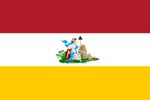Sorrenian general election, April 2014
This article is about the Sorrenian General Election of April 2014. For the Presidential Election of April 2014, see Sorrenian Presidential Election, April 2014.
| |||||||||||||||||||||||||||||||||||||||||||||||||||||||||||||||||
5/6 seats to the National Assembly 4 seats needed for a majority | |||||||||||||||||||||||||||||||||||||||||||||||||||||||||||||||||
|---|---|---|---|---|---|---|---|---|---|---|---|---|---|---|---|---|---|---|---|---|---|---|---|---|---|---|---|---|---|---|---|---|---|---|---|---|---|---|---|---|---|---|---|---|---|---|---|---|---|---|---|---|---|---|---|---|---|---|---|---|---|---|---|---|---|
| Turnout | 90% | ||||||||||||||||||||||||||||||||||||||||||||||||||||||||||||||||
| |||||||||||||||||||||||||||||||||||||||||||||||||||||||||||||||||
| |||||||||||||||||||||||||||||||||||||||||||||||||||||||||||||||||
Key Issues
• Communism - due to the rise of the Egalitarian Party - an explicitly anti-communist organization - the communist ideology became a key point in the April General Election. As a result of the ideological differences, the Socialist and Communist Parties focused hugely on defending their beliefs, while the Egalitarian and Conservative Parties reaffirmed their anti-communist stance.
• Imperialism - in its ideological form - became a big part of the election, with the left-wing accusing Levi Newman (leader of the Egalitarian Party and Presidential candidate) of supporting a transformation to an imperialist government, due to several propaganda pieces released by the Egalitarian Party.
• Internationalism - worries were raised that the Egalitarian Party could be a front for the monarchist New Kingdom of Lundy, due to the similarities in ideology and Levi's position as Monarch of Lundy; Levi dismissed such claims. Some also worried that if the centrist and right-wing elements of Sorrenia secured a victory, the Communist Party (whom some accused of being a front for the communist nation of Marksovka) would attempt a coup.
• Constitution - many elements of Sorrenia were angry that a constitution had not been put in place, arguing that this allowed the President to take dictatorial positions without fear of repercussions. After a poll showed a huge majority of Sorrenians supported the creation of a Constitution, all parties supported the creation (except the Communist Party who did not comment on the matter), with the Egalitarian Party promising it would be their first act of government.
Political Parties
Socialist Party
The Socialist Party's election campaign was very similar to the first two elections. The party focused on its campaign of experience once again, noting President Miles of Sorrenia's and Prime Minister Emanuel Terranova's work in the nation, both of whom were members of the Socialist Party. A notable change in their stance however was the vehement pro-communist stance, which had not been seen in earlier elections. For the first time, the Socialist Party created propaganda in the April Election, attacking the Egalitarian Party's "imperialist and reactionary stances" - this pleased much of the left-wing, however annoyed many centrists who did not like Sorrenia's focus on ideology.
Egalitarian Party
Established just one week away from the election, the Egalitarian Party focused on a return to centrism, and attacked the Socialist and Communist parties, due to their support of macronational leaders such as Lenin and Fidel Castro. They also campaigned for the creation of a constitution, in order to "protect the basic rights of Sorrenians". Due to stark ideological differences, the Egalitarian Party became a key part of the notorious debates and propaganda that took place during the election.
Communist Party
The Communist Party was established from elements of the Socialist Party who wanted to focus more on communism, rather than a big-tent approach of Socialism. As a result, the CPSF became notable for their radical stances, wanting to further Sorrenia from a secular state to an atheist state. Furthermore, they strongly opposed the regional monarchies in Sorrenia, highlighting federalism as a key part of their ideology. The party remained friendly with the Socialist Party, and was a key element of the ideological debates that took place.
Liberty Party
The Liberty Party defined itself as the only true centrist party remaining in Sorrenia, due to the Egalitarian Party's anti-communist and anti-socialist stances. The party also stated that the ideological debates harmed Sorrenia, preferring to focus on elements of agreement between the various parties. The Liberty Party was however at risk of losing support to the Egalitarian Party, due to their passive attitude towards the left in Sorrenia, which many anti-Kozlovans and new anti-left Sorrenians despised. Similar to the January Election, the Liberty Party promised to improve Sorrenia's cultural elements, which still had not come into fruition.
Conservative Party of Sorrenia
Founded six days before the Egalitarian Party, the Conservative Party modeled themselves off the British Conservative Party (shown by their logo) - in some ways, this alienated the right-wing elements of Sorrenia, who aligned themselves with American right-wing politics. As a result, the Conservative Party quickly stagnated, and once the Egalitarian Party emerged, entered into an alliance. Like the Egalitarian Party, they became a big part of debating the left-wing and also demanded a Sorrenian Constitution, however unlike the official stance of the Egalitarians, stated that Sorrenia should shift towards the right, both economically and socially.
Result
The result of the April Election still has an effect on Sorrenia. The popular rise of the Egalitarian Party, who secured much of the right-wing and centrist elements of Sorrenia gave them a seat, with 15% of the vote. As a result, they ensured a foothold for the right-wing in Sorrenia, which the later Sorrenian Party for Freedom and Democracy embraced.
The Socialist Party (although they lost 16% of their vote and 1 seat) stated they were happy about the result, due to the rise of the Communist Party. As a result, the two parties entered into a coalition with 4/6 seats in the National Assembly. This angered much of the right-wing and centrist elements in Sorrenia, and ensured Sorrenia remained left-wing.
As expected, the Liberty Party lost a considerable amount of their votes, from 25% to 15%; a loss of 10%. No longer were they the second largest party in Sorrenia. This led to the party's later stagnation, which remained the case until Andrew Janiszewski took over the party leadership in August. Another expected result was the Conservative Party's lack of votes or seats, as they chose to support the Egalitarian Party. The Conservative Party remained a supportive element in Sorrenia until its dissolution after the September Election, and never held a seat in the National Assembly.



